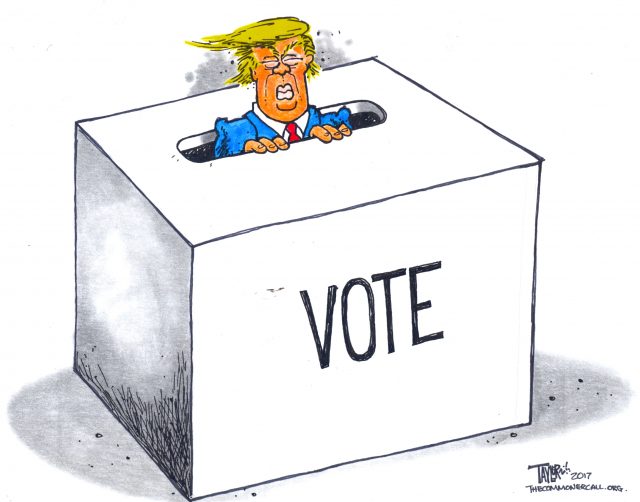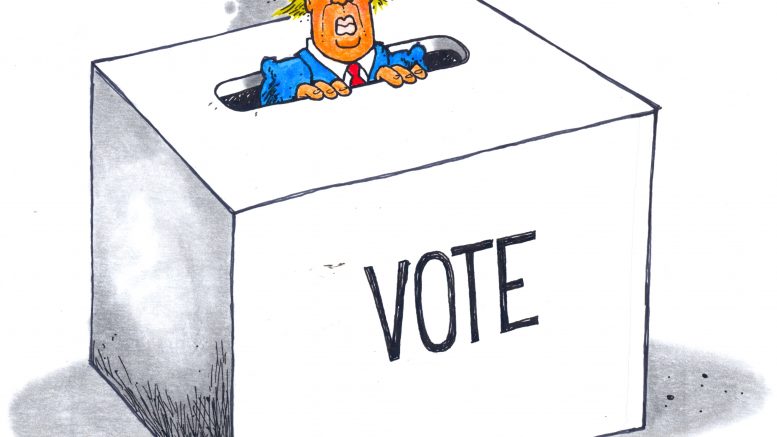
By Russ Feingold
The Guardian (9/5/17)
So much news in the US recently has been upsetting, and rarely uplifting; but the champions of voting rights have reasons to be both aghast at recent headlines and encouraged by them. On the one hand, the Trump-Pence “election integrity” commission’s every move continues to underscore concerns that it is driving at 90mph towards national voter suppression. Then there is the sudden decision by Donald Trump and attorney general Jeff Session’s Department of Justice to support purging voter rolls in Ohio. It’s enough to make voters feel like they have a target on their back.
On the other hand, Rhode Island recently became the ninth state to enact AVR – automatic voter registration – and on 28 August Illinois became the 10th when its Republican governor signed the bill into law. While the federal government perpetuates myths and conspiracies in an effort to justify taking the vote away from citizens, more and more states are taking local action to strengthen and protect this most fundamental democratic right.
Rather than raising concerns about purging voter rolls and voter suppression, the country has an opportunity to champion voting rights and actually improve the legitimacy of our elections and our democracy.
Roughly 41% of eligible voters didn’t vote in the 2016 election. Such low voter participation is a significant dent in the credibility and legitimacy of our elections. Our government gains its legitimacy by being representative of the people, but if the reality is that it only represents a little more than half of eligible voters, that premise is shaky.
We cannot make people vote, but we can certainly make it easier for them to do so. And it can be achieved without pillaging state voting records to build a national voter database that is susceptible to abuse and hacking.
AVR involves two steps. The first is that eligible voters are registered to vote, or have their voting information updated, any time they interact with state agencies, or with federal agencies under national AVR. Second, those agencies electronically relay the information to appropriate state electoral officials. The results are more registered voters and more up-to-date voter rolls.
It is one of the single greatest ways to improve the legitimacy of our elections, and in turn our democracy. It results in a default “opt-out” system, whereby people have to take action to opt out of being registered, rather than having to go out of their way to register to vote. …
(Commoner Call cartoon by Mark L. Taylor, 2017. Open source and free to use with link to www.thecommonercall.org )
- South Dakota GOP Secretary Of State Purges Voters As She Runs For Congress — And Most Of Them Are Democrats – South Dakota Republican Secretary of State Shantel Krebs, who is running for a U.S. congressional seat, has effectively invalidated 3 percent of registered voters in the state — and the large majority of them are Democrats. The Dakota Free Press reported that although the total number of voters had increased to 597,856 between the general election and June 2017, that number is now falling due to the voter purge. “Thus, in three months, the Secretary of State managed to scrub 3.06% of the names on the voter rolls,” the Free Press explained. “Looking just at Active voters and using the 2.14% August purge rate as the baseline, Democrats got purged harder than Republicans.” In August alone, 2.63 percent of purged voters were registered as Democrats, 1.87 percent were Republican and 2.01 percent were independents. … Read the Rest
*****
Schwarzenegger’s Next Bipartisan Political Act: Terminating Gerrymandering
By Joe Garofoli
San Francisco Chonicle (9/4/17)
Former California Gov. Arnold Schwarzenegger is a master at marketing, having scaled to the top of three different professions.

